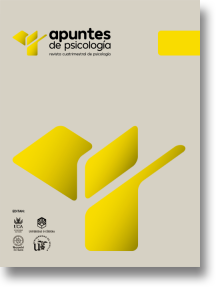Origins, extension and applications of the equivalence of stimuli
DOI:
https://doi.org/10.55414/cxcwq342Keywords:
equivalence classes , origins, analogical reasoning, autism, revision and experimental basesAbstract
The present work is a revision on the current lines of research inside the phenomenon of the equivalence classes whose main characteristic is the emergence of relations of control of stimuli without direct training. It begins with a description of the pioneer studies, the properties of the phenomenon and the reasons for its study. It continues with an exploration on the origins of the not-trained relations, highlighting the importance of the laboratory research with non-human. It concludes, on the one hand, with the use of the paradigm of the equivalence classes in the study of the analogical reasoning; and on the other hand, with their therapeutic use in the treatment of autism.
Downloads
References
.
Downloads
Published
Issue
Section
License
Copyright (c) 2022 APUNTES DE PSICOLOGÍA

This work is licensed under a Creative Commons Attribution-NonCommercial-NoDerivatives 4.0 International License.


















